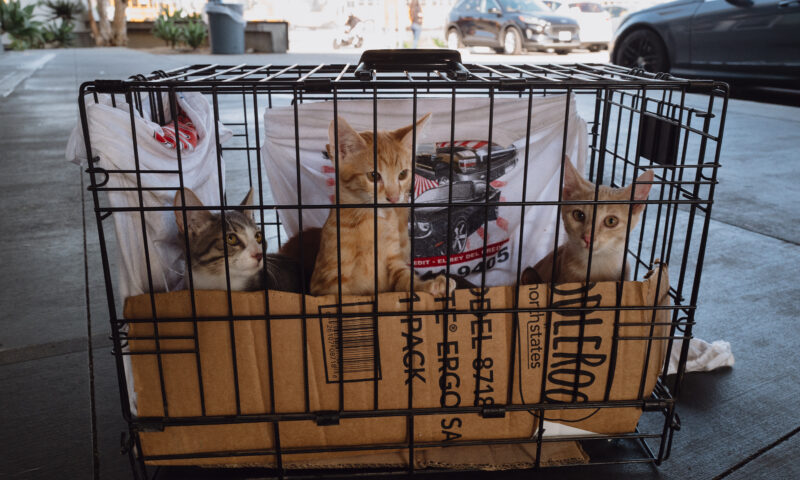Column - State of Inequality
L.A. Hotel Workers Fight an Uphill Battle to Live Where They Work
Making developers who stoke the housing crisis repair the damage they’ve done.

Brenda Mendoza is an Angeleno. Born and raised in the Koreatown neighborhood of central Los Angeles, she returned there as a young adult to begin raising her own family. Thirteen years ago, at age 28, she took a job as a uniform attendant at the JW Marriott L.A. Live hotel, about 10 minutes from home.
It was Mendoza’s plan to stay. But after nearly a decade of rapidly rising housing costs in her old neighborhood, the mother of two faced an unhappy truth: She and her family could no longer afford to live in the city.
Join our email list to get the stories that mainstream news is overlooking.
Sign up for Capital & Main’s newsletter.
The first move was to Downey, south of downtown and a 40-minute commute to work on most days. “But our rent just kept going up,” she said. When it hit $3,000 a month for a two-bedroom apartment, the family made a more drastic decision.
“I now drive 200 miles round trip daily,” said Mendoza, speaking from her home in Apple Valley, a town in San Bernardino County. “We wanted our own house to live in. We did what we had to do.”
The crisis of affordable housing in Los Angeles is hardly new. The metropolitan area has for decades been the most housing overcrowded in the country, the product of insufficient income and a chronic inventory shortage. Those living in overcrowded conditions face a variety of disadvantages and disproportionately poor health outcomes, and the pandemic illustrated the danger, with overcrowded people experiencing higher early rates of COVID infection and death.
Overcoming problems that have been 30 years in the making will, of course, require action on several fronts and by several parties. There’s no single way past L.A.’s affordable housing crisis. But Mendoza’s workers union has an idea of one place to look: the hotel industry itself.
* * *
Last week, outside the L.A. Live Marriott, more than 1,000 members of UNITE HERE Local 11 gathered for a demonstration. Inside, executives mingled at the American Lodging Investment Summit, which is billed as the largest hotel investment conference in the world.
The union members’ goal: to make the investors understand they’re part of the problem in L.A. — and should be part of the solution.
“We believe there are more hotel rooms under construction than affordable housing in the city of Los Angeles.”
~ Kurt Petersen, co-president of UNITE HERE Local 11
“We believe there are more hotel rooms under construction than affordable housing in the city of Los Angeles,” said Kurt Petersen, co-president of UNITE HERE Local 11. (Disclosure: UNITE HERE is a financial supporter of Capital & Main.)
A proposal pushed by the union would address at least some of the fallout from the rapid expansion in hotel development. Under the Responsible Hotel Ordinance, which goes before L.A. voters in March 2024, developers who demolish or convert existing housing in order to build their hotels would be required to replace the inventory with an equal number of affordable housing units.
“If there is a replacement issue with affordable housing, the developers need to replace it,” Petersen said. “They’re building hotels without regard for the current housing on site, and without regard for the housing problem in the city in general — and right now the law doesn’t require them to.”
For decades, under state law, corporations have been able to develop new hotel properties in Los Angeles with only limited consideration given to the effect on the existing neighborhood. If the construction of a new hotel means blowing down a rent-stabilized apartment complex, for example, the developers are under no requirement to address the resulting reduction in affordable housing — only to build as many units as they tore down.
That dynamic is being felt in the city right now. According to data presented at the investment summit, Los Angeles has the highest number of hotel rooms under development in the country, with almost 20,000 rooms in the pipeline and more than 3,600 in active construction. With the 2028 Olympic Games and its attendant tourism crush approaching in L.A., the rate of development won’t abate anytime soon.
The Responsible Hotel Ordinance would also require that hotel projects of 100 or more rooms secure a conditional use permit, which would be contingent on a review of the development’s impact on its surrounding neighborhood, including local affordable housing, public transit, child care and the expected wages to be paid the hotel’s workers.
“We want to be paid enough to live where we work.”
~ Brenda Mendoza, JW Marriott L.A. Live hotel employee
For the union’s workers, the proposal strikes close. The No. 1 issue among the 28,000 UNITE HERE Local 11 members in Southern California, Petersen said, is trying to afford a place to live that is anywhere near where they work. While the union battles for wage hikes in negotiations with hotels, airports, restaurants, sports venues and convention centers, the spiraling cost of housing regularly outstrips annual pay raises and further squeezes workers who are already financially vulnerable. The Los Angeles hotel minimum wage is $18.86 an hour, or about $3,000 per month before taxes.
Mendoza, her husband and two sons, now ages 23 and 21, had no intention of leaving L.A. — “It’s home,” she said. But as their rent rose, they were stretched to a breaking point. Their only hope of owning a place was to move far outside the metropolitan area and join the ranks of long commuters.
Mendoza’s husband and both sons have jobs in Los Angeles’ meatpacking industry that require them to start between 5 and 5:30 a.m. each day. Thus, Mendoza said, the family rises most days at 2:30 a.m. in order to get ready and then make the commute, which she said is an hour and a half going in and can be as much as 2 ½ hours on the return to Apple Valley.
Mendoza said a few co-workers have similar commutes, and almost all of them live well outside Los Angeles itself. “We want to be paid enough to live where we work,” she said, “but it’s tough to keep up with what it costs to have a place to live.”
* * *
Requiring hotel developers to replace the affordable housing they demolish could be a useful step in at least preserving the supply of such housing in Los Angeles, but it hasn’t been the public focus of the proposed ordinance. Instead, conversation has swirled around a separate requirement, which would force hotels to open their unused inventory to people who are unhoused.
The proposal, Petersen said, plays off the success of California’s Project Roomkey, which at the height of the pandemic turned vacant hotels into short-term shelters. At a time when estimates suggest more than 60,000 people are unhoused in Los Angeles County, the need for more short-term solutions is obvious.
Project Roomkey, though, was a voluntary operation, just as existing hotel voucher programs around L.A. have been for years. The Responsible Hotel Ordinance would make it mandatory for hotels to report daily their number of unused hotel rooms and make them available to temporarily house people, for which they’d be paid market rate by the city. The city would naturally gravitate toward less expensive hotels, but no hotel would be exempt.
Bringing hotel developers into the affordable housing equation has a chance to make a long-term impact on a city where the cost of living is skyrocketing.
The hotel industry and its supporters were not pleased, and they showed up in force at a meeting of the City Council to register their opposition, even though many hotels participated in Project Roomkey, which is winding down. “Hotels did not cause the homeless problem. Hotels are not the solution for the homeless problem,” Stuart Waldman, president of the Valley Industry and Commerce Association, told councilmembers during a public comment session last year.
The council voted 12-0 against adopting the ordinance outright, opting instead to put it before Los Angeles voters next year. The union easily qualified the measure for such a vote, but it will be wildly outspent in public campaigning by the hotel industry between now and March 2024.
While the requirement to offer housing to homeless people sparked the most emotion, bringing hotel developers into the affordable housing equation has a chance to make a long-term impact on a city where the cost of living is skyrocketing. Should the larger ordinance ultimately fail, its supporters would do well to bring back the development requirements on their own.
“We want the industry to take accountability for what is happening, because it’s happening to us,” Brenda Mendoza said. “Of course they aren’t the only answer. But they can be a part of the solution, and we need them to be.”
Copyright 2023 Capital & Main

-

 Column - State of InequalityJanuary 22, 2026
Column - State of InequalityJanuary 22, 2026On Eve of Strike, Kaiser Nurses Sound Alarm on Patient Care
-

 Column - California UncoveredJanuary 14, 2026
Column - California UncoveredJanuary 14, 2026Keeping People With Their Pets Can Help L.A.’s Housing Crisis — and Mental Health
-

 Latest NewsJanuary 16, 2026
Latest NewsJanuary 16, 2026Homes That Survived the 2025 L.A. Fires Are Still Contaminated
-

 The SlickJanuary 20, 2026
The SlickJanuary 20, 2026The Rio Grande Was Once an Inviting River. It’s Now a Militarized Border.
-

 Column - State of InequalityJanuary 15, 2026
Column - State of InequalityJanuary 15, 2026When Insurance Says No, Children Pay the Price
-

 Latest NewsJanuary 21, 2026
Latest NewsJanuary 21, 2026Honduran Grandfather Who Died in ICE Custody Told Family He’d Felt Ill For Weeks
-

 The SlickJanuary 19, 2026
The SlickJanuary 19, 2026Seven Years on, New Mexico Still Hasn’t Codified Governor’s Climate Goals
-

 Latest NewsJanuary 22, 2026
Latest NewsJanuary 22, 2026‘A Fraudulent Scheme’: New Mexico Sues Texas Oil Companies for Walking Away From Their Leaking Wells

